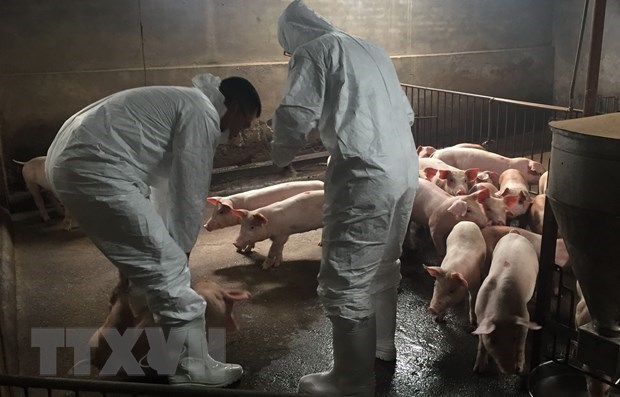FAO helps Vietnam control African swine fever
The UN Food and Agriculture Organisation (FAO) in Vietnam has pledged to help the country control the spread of African swine fever (ASF), that recently broke out in the northern provinces of Thai Binh and Hung Yen.
 Illustrative image (Photo: VNA)
Illustrative image (Photo: VNA)Hanoi (VNA) – The UN Food and Agriculture Organisation (FAO) in Vietnam has pledged to help the country control the spread of African swine fever (ASF), that recently broke out in the northern provinces of Thai Binh and Hung Yen.
Pawin Padungtod, Senior Technical Coordinator of FAO Vietnam’s Emergency Centre for Transboundary Animal Diseases (ECTAD), said the organisation is mobilising resources to support the country.
He underscored the significance of a timely report on suspected cases and the implementation of the action plan to control the disease effectively.
Coordination between breeders, traders, government agencies, and the public is crucial to preventing the spread of ASF in Vietnam, said Padungtod.
There has been no effective vaccine to protect swine from the disease, he said, noting that the ASF virus is very hardy and can survive long periods in both very cold and very hot weather, and even in dried or cured pork products.
He, therefore, stressed that ensuring strict biosafety at pig farms can prevent the presence of ASF as well as risks to the livelihood of breeders.
ASF is a fatal animal disease affecting pigs and wild boars with up to 100 percent mortality, and subsequently damaging trade and causing global economic losses. The ASF virus does not affect humans. The only known preventative measure is a mass cull of infected livestock. The disease spreads by contact between infected pigs or other wild animals and can inflict massive economic damage on farms.
Since the ASF outbreaks were recorded in China in 2018, the FAO has provided technical support Vietnam to build a national action plan on promptly responding to and controlling the virus. It has also assisted the country in evaluating the risks and organising an exercise on emergency response to ASF in the northern mountainous province of Lao Cai.
At the same time, the FAO held regional seminars on ASF prevention for animal health workers from Vietnam, Laos, Myanmar, and China, in an effort to prevent the spread of the disease in Southeast Asia.
According to the Department of Animal, the ASF virus was discovered in Hung Yen’s Trung Nghia commune (Hung Yen city) and Yen Hoa commune (Yen My district), with the results of samples taken from other farms surrounding the outbreak spots still pending.
Meanwhile, in Thai Binh, a number of household-based pig farms in Hung Ha district’s Dong Do commune were also found to be contaminated with the disease. The results of samples taken from nearby farms were negative.
In response to the detection, the Ministry of Agriculture and Rural Development (MARD) has directed the culling of all infected pigs and the crucial conduction of a cleaning process in the hotspots and high-risk locations. The transport, slaughtering, and distribution of pork from the ASF-hit areas are under tight monitoring by competent agencies, while mass examinations of all pig farms in these communes will be launched. –VNA












